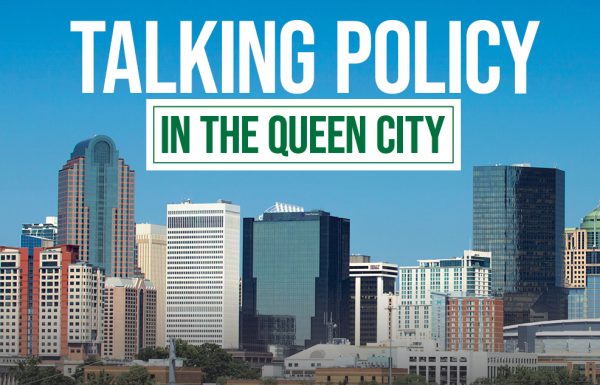UNC Charlotte to Host Former FEMA Administrator Brock Long at Annual Public Policy Program

Former Federal Emergency Management Agency (FEMA) Administrator Brock Long will headline UNC Charlotte’s third annual “Talking Policy in the Queen City” symposium Wednesday, Feb. 24, from noon to 1:15 p.m. EST via livestream.
The event, hosted by the UNC Charlotte Public Policy Ph.D. Program and the Gerald G. Fox Master of Public Administration Program, in partnership with the UNC Charlotte Urban Institute, calls attention to national, state and local policy insights and perspectives and how they affect citizens and organizations in Charlotte and beyond. This year’s discussion with Long focuses on how organizations can improve their cultural preparedness and emergency management systems.
“Given the COVID-19 pandemic, we have all had to learn how to better prepare for unexpected emergencies,” said Stephanie Moller, director of UNC Charlotte’s Public Policy Ph.D. Program. “This year’s subject is relevant and challenging to every level of our society, and we are fortunate to be able to combine the insights of our interdisciplinary faculty with Brock’s subject matter expertise.”

Long served as FEMA administrator from 2017 to 2019, overseeing 144 presidentially declared disasters, including three of the nation’s most devastating hurricanes, and 112 wildfires. During his tenure at FEMA, Long helped transform the agency’s business enterprise, creating the community lifeline and FEMA Integration Teams, and he implemented pre-disaster mitigation efforts, a priority under the Disaster Recovery Reform Act.
Long will share insights on successful emergency management and strategies for both natural and man-made disasters, including pandemics, highlighting that an effective response to a disaster requires collaboration and cooperation at all levels of society. Long will also touch on what state and local government, private companies, nonprofit organizations, and the general public should be doing today to prepare for tomorrow’s emergencies.
“The UNC Charlotte MPA program prides itself on the integration of theory and practice, so it is especially fitting that we are hosting a practitioner the stature of Brock Long, who has executed emergency management policy at every level of government,” said Thomas Barth, director of the UNC Charlotte MPA Program.
Kevin Staley, retired deputy director of Mecklenburg EMS Agency (MEDIC), will moderate the discussion. Staley serves on the North Carolina Emergency Medical Services Advisory Council and is a commissioner on the state’s Emergency Response Commission. He also brings his expertise to UNC Charlotte students as an adjunct faculty member.
The Pam Fawcett-Brandon and William P. Brandon Endowment for the Graduate Public Policy Program also is providing support for the event.
The event is free and open to the public. For more information and to register, visit the event website.
Event Sponsors
UNC Charlotte Public Policy Doctoral Program
The interdisciplinary Public Policy Ph.D. Program prepares students to become researchers, decision makers and policy analysts in local, state or federal governments, not-for-profit agencies, for-profit institutions and academia. Students learn the foundations of policy development, implementation and evaluation, gaining the expertise to pursue varied policy domains, adapt to changing policy environments and clearly communicate research results to shape policy outcomes.
UNC Charlotte Gerald G. Fox Master of Public Administration Program
The Gerald G. Fox Master of Public Administration (MPA) Program has a three-part mission of preparing students for leadership careers in the public and nonprofit sectors, conducting research to advance the field of public administration, and serving the community through applied research projects and internships. The program was listed in the top 21% of U.S. News & World Report’s 2021 rankings of public affairs programs nationwide.
UNC Charlotte Urban Institute
The Urban Institute is a nonpartisan, applied research and community outreach center at UNC Charlotte. Founded in 1969, it provides services including technical assistance and training in operations and data management; public opinion surveys; and research and analysis around economic, environmental, and social issues affecting the Charlotte region. The institute is part of UNC Charlotte’s Office of Urban Research and Community Engagement (formerly known as Metropolitan Studies), which is a unit of Academic Affairs.